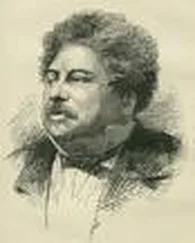Alexandre Dumas - Mary Stuart
Здесь есть возможность читать онлайн «Alexandre Dumas - Mary Stuart» — ознакомительный отрывок электронной книги совершенно бесплатно, а после прочтения отрывка купить полную версию. В некоторых случаях можно слушать аудио, скачать через торрент в формате fb2 и присутствует краткое содержание. Жанр: literature_19, foreign_antique, foreign_prose, на английском языке. Описание произведения, (предисловие) а так же отзывы посетителей доступны на портале библиотеки ЛибКат.
- Название:Mary Stuart
- Автор:
- Жанр:
- Год:неизвестен
- ISBN:нет данных
- Рейтинг книги:3 / 5. Голосов: 1
-
Избранное:Добавить в избранное
- Отзывы:
-
Ваша оценка:
- 60
- 1
- 2
- 3
- 4
- 5
Mary Stuart: краткое содержание, описание и аннотация
Предлагаем к чтению аннотацию, описание, краткое содержание или предисловие (зависит от того, что написал сам автор книги «Mary Stuart»). Если вы не нашли необходимую информацию о книге — напишите в комментариях, мы постараемся отыскать её.
Mary Stuart — читать онлайн ознакомительный отрывок
Ниже представлен текст книги, разбитый по страницам. Система сохранения места последней прочитанной страницы, позволяет с удобством читать онлайн бесплатно книгу «Mary Stuart», без необходимости каждый раз заново искать на чём Вы остановились. Поставьте закладку, и сможете в любой момент перейти на страницу, на которой закончили чтение.
Интервал:
Закладка:
Melville availed himself of this opportunity to remind Elizabeth of the desire she had shown to see Mary, three or four years before; but Elizabeth said, besides her country’s affairs, which necessitated her presence in the heart of her possessions, she did not care, after all she had heard said of her rival’s beauty, to expose herself to a comparison disadvantageous to her pride. She contented herself, then, with choosing as her proxy the Earl of Bedford, who set out with several other noblemen for Stirling Castle, where the young prince was christened with great pomp, and received the name of Charles James.
It was remarked that Darnley did not appear at this ceremony, and that his absence seemed to scandalise greatly the queen of England’s envoy. On the contrary, James Hepburn, Earl of Bothwell, had the most important place there.
This was because, since the evening when Bothwell, at Mary’s cries, had run to oppose the murder of Rizzio, he had made great way in the queen’s favour; to her party he himself appeared to be really attached, to the exclusion of the two others, the king’s and the Earl of Murray’s. Bothwell was already thirty-five years old, head of the powerful family of Hepburn, which had great influence in East Lothian and the county of Berwick; for the rest, violent, rough, given to every kind of debauchery, and capable of anything to satisfy an ambition that he did not even give himself the trouble to hide. In his youth he had been reputed courageous, but for long he had had no serious opportunity to draw the sword.
If the king’s authority had been shaken by Rizzio’s influence, it was entirely upset by Bothwell’s. The great nobles, following the favourite’s example, no longer rose in the presence of Darnley, and ceased little by little to treat him as their equal: his retinue was cut down, his silver plate taken from him, and some officers who remained about him made him buy their services with the most bitter vexations. As for the queen, she no longer even took the trouble to conceal her dislike for him, avoiding him without consideration, to such a degree that one day when she had gone with Bothwell to Alway, she left there again immediately, because Darnley came to join her. The king, however, still had patience; but a fresh imprudence of Mary’s at last led to the terrible catastrophe that, since the queen’s liaison with Bothwell, some had already foreseen.
Towards the end of the month of October, 1566, while the queen was holding a court of justice at Jedburgh, it was announced to her that Bothwell, in trying to seize a malefactor called John Elliot of Park, had been badly wounded in the hand; the queen, who was about to attend the council, immediately postponed the sitting till next day, and, having ordered a horse to be saddled, she set out for Hermitage Castle, where Bothwell was living, and covered the distance at a stretch, although it was twenty miles, and she had to go across woods, marshes, and rivers; then, having remained some hours tete-a-tete with him, she set out again with the same sped for Jedburgh, to which she returned in the night.
Although this proceeding had made a great deal of talk, which was inflamed still more by the queen’s enemies, who chiefly belonged to the Reformed religion, Darnley did not hear of it till nearly two months afterwards – that is to say, when Bothwell, completely recovered, returned with the queen to Edinburgh.
Then Darnley thought that he ought not to put up any longer with such humiliations. But as, since his treason to his accomplices, he had not found in all Scotland a noble who would have drawn the sword for him, he resolved to go and seek the Earl of Lennox, his father, hoping that through his influence he could rally the malcontents, of whom there were a great number since Bothwell had been in favour. Unfortunately, Darnley, indiscreet and imprudent as usual, confided this plan to some of his officers, who warned Bothwell of their master’s intention. Bothwell did not seem to oppose the journey in any way; but Darnley was scarcely a mile from Edinburgh when he felt violent pains none the less, he continued his road, and arrived very ill at Glasgow. He immediately sent for a celebrated doctor, called James Abrenets, who found his body covered with pimples, and declared without any hesitation that he had been poisoned. However, others, among them Walter Scott, state that this illness was nothing else than smallpox.
Whatever it may have been, the queen, in the presence of the danger her husband ran, appeared to forget her resentment, and at the risk of what might prove troublesome to herself, she went to Darnley, after sending her doctor in advance. It is true that if one is to believe in the following letters, dated from Glasgow, which Mary is accused of having written to Bothwell, she knew the illness with which he was attacked too well to fear infection. As these letters are little known, and seem to us very singular we transcribe them here; later we shall tell how they fell into the power of the Confederate lords, and from their hands passed into Elizabeth’s, who, quite delighted, cried on receiving them, “God’s death, then I hold her life and honour in my hands!”
FIRST LETTER
“When I set out from the place where I had left my heart, judge in what a condition I was, poor body without a soul: besides, during the whole of dinner I have not spoken to anyone, and no one has dared to approach me, for it was easy to see that there was something amiss. When I arrived within a league of the town, the Earl of Lennox sent me one of his gentlemen to make me his compliments, and to excuse himself for not having come in person; he has caused me to be informed, moreover, that he did not dare to present himself before me after the reprimand that I gave Cunningham. This gentleman begged me, as if of his own accord, to examine his master’s conduct, to ascertain if my suspicions were well founded. I have replied to him that fear was an incurable disease, that the Earl of Lennox would not be so agitated if his conscience reproached him with nothing, and that if some hasty words had escaped me, they were but just reprisals for the letter he had written me.
“None of the inhabitants visited me, which makes me think they are all in his interests; besides, they speak of him very favourably, as well as of his son. The king sent for Joachim yesterday, and asked him why I did not lodge with him, adding that my presence would soon cure him, and asked me also with what object I had come: if it were to be reconciled with him; if you were here; if I had taken Paris and Gilbert as secretaries, and if I were still resolved to dismiss Joseph? I do not know who has given him such accurate information. There is nothing, down to the marriage of Sebastian, with which he has not made himself acquainted. I have asked him the meaning of one of his letters, in which he complains of the cruelty of certain people. He replied that he was – stricken, but that my presence caused him so much joy that he thought he should die of it. He reproached me several times for being dreamy; I left him to go to supper; he begged me to return: I went back. Then he told me the story of his illness, and that he wished to make a will leaving me everything, adding that I was a little the cause of his trouble, and that he attributed it to my coldness. ‘You ask me,’ added he, ‘who are the people of whom I complain: it is of you, cruel one, of you, whom I have never been able to appease by my tears and my repentance. I know that I have offended you, but not on the matter that you reproach me with: I have also offended some of your subjects, but that you have forgiven me. I am young, and you say that I always relapse into my faults; but cannot a young man like me, destitute of experience, gain it also, break his promises, repent directly, and in time improve? If you will forgive me yet once more, I will promise to offend you never again. All the favour I ask of you is that we should live together like husband and wife, to have but one bed and one board: if you are inflexible, I shall never rise again from here. I entreat you, tell me your decision: God alone knows what I suffer, and that because I occupy myself with you only, because I love and adore only you. If I have offended you sometimes, you must bear the reproach; for when someone offends me, if it were granted me to complain to you, I should not confide my griefs to others; but when we are on bad terms, I am obliged to keep them to myself, and that maddens me.’
Читать дальшеИнтервал:
Закладка:
Похожие книги на «Mary Stuart»
Представляем Вашему вниманию похожие книги на «Mary Stuart» списком для выбора. Мы отобрали схожую по названию и смыслу литературу в надежде предоставить читателям больше вариантов отыскать новые, интересные, ещё непрочитанные произведения.
Обсуждение, отзывы о книге «Mary Stuart» и просто собственные мнения читателей. Оставьте ваши комментарии, напишите, что Вы думаете о произведении, его смысле или главных героях. Укажите что конкретно понравилось, а что нет, и почему Вы так считаете.












